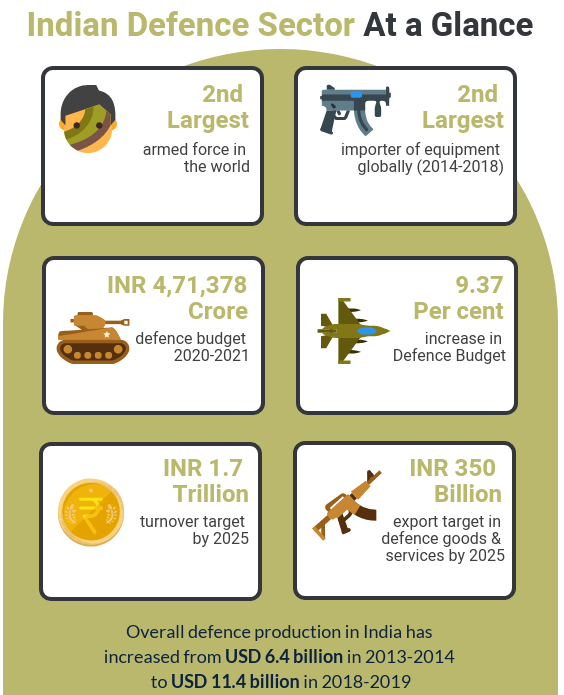Internal Security
Draft Defence Production and Export Promotion Policy (2020)
- 04 Aug 2020
- 5 min read
Why in News
Recently, the Ministry of Defence has formulated a draft Defence Production and Export Promotion Policy 2020 (DPEPP 2020).
- The DPEPP 2020 is envisaged as an overarching guiding document to provide a focused, structured and significant thrust to defence production capabilities of the country for self-reliance and exports.
Key Points
- Goals and Objectives:

- To achieve a turnover of Rs. 1,75,000 crore including export of Rs. 35,000 crore in Aerospace and Defence goods and services by 2025.
- To develop a dynamic, robust and competitive Defence industry, including Aerospace and Naval Shipbuilding industry to cater to the needs of Armed forces with quality products.
- To reduce dependence on imports and take forward "Make in India" initiatives through domestic design and development.
- To promote the export of defence products and become part of the global defence value chains.
- To create an environment that encourages research and development (R&D), rewards innovation, create Indian Intellectual Property (IP) ownership and promotes a robust and self-reliant defence industry.
- Outlined Strategies:
- Procurement Reforms:
- A Project Management Unit (PMU) will be set up for the development and production of technologies involved, life cycle costs and maintenance requirements of platforms, equipment and weapon systems.
- It also aims to move away from licensed production to design, develop and produce indigenously.
- It also aims to own the design rights and IP of the systems projected in the Long Term Integrated Perspective Plan (LTIPP) and a Technology Assessment Cell (TAC) would be created.
- The TAC would also assess the industrial capability for design, development and production, including re-engineering for production of major systems such as armoured vehicles, submarines, fighter aircraft, helicopters and radars with the major industries in the country.
- Indigenisation And Support to MSMEs/Startups:
- The indigenisation policy aims to create an industry ecosystem to indigenise the imported components (including alloys and special materials) and sub-assemblies for defence equipment and platforms manufactured in India. 5,000 such items are proposed to be indigenised by 2025.
- More than 50 startups are currently developing new ‘fit-for-military-use’ technologies/products.
- Optimise Resource Allocation:
- The share of domestic procurement in overall Defence procurement is about 60%.
- To enhance procurement from domestic industry, the procurement needs to be doubled from the current Rs. 70,000 crore to Rs. 1,40,000 crore by 2025.
- Investment Promotion and Ease of Doing Business:
- India is already a large aerospace market with rising passenger traffic and increasing military expenditure, as a result of which the demand for aircraft (fixed and rotary wings) is rising.
- The opportunities in the aerospace industry have been identified in the following segments - aircraft build work, aircraft Maintenance, Repair and Overhaul (MRO), helicopters, engine manufacturing and MRO work, line replaceable units, Unmanned Aerial Vehicles (UAVs) and upgrades and retrofits.
- The improvement in market size, demographic dividend and availability of diverse skill sets are evident from India's ranking in the World Bank’s ‘Ease of Doing Business’ (EoDB) report.
- The investments in the defence sector need to regularly sustain the steady supply of orders.
- Innovation and R&D:
- Innovations for Defence Excellence (iDEX) has been operationalised to provide necessary incubation and infrastructure support to the startups in the defence area.
- iDEX would be further scaled up to engage with 300 more startups and develop 60 new technologies/products during the next five years.
- Mission Raksha Gyan Shakti was launched to promote a greater culture of innovation and technology development and file a higher number of patents in Defence Public Sector Undertakings (DPSUs), Ordnance Factory Board (OFB). It would be scaled up for promoting the creation of Intellectual Property in the sector and its commercial utilisation.
- Procurement Reforms:
Way Forward
- Self-reliance in defence manufacturing is a crucial component of effective defence capability and to maintain national sovereignty and achieve military superiority.
- The attainment of this will ensure strategic independence, cost-effective defence equipment and may lead to saving on defence import bill, which can subsequently finance the physical and social infrastructure.




